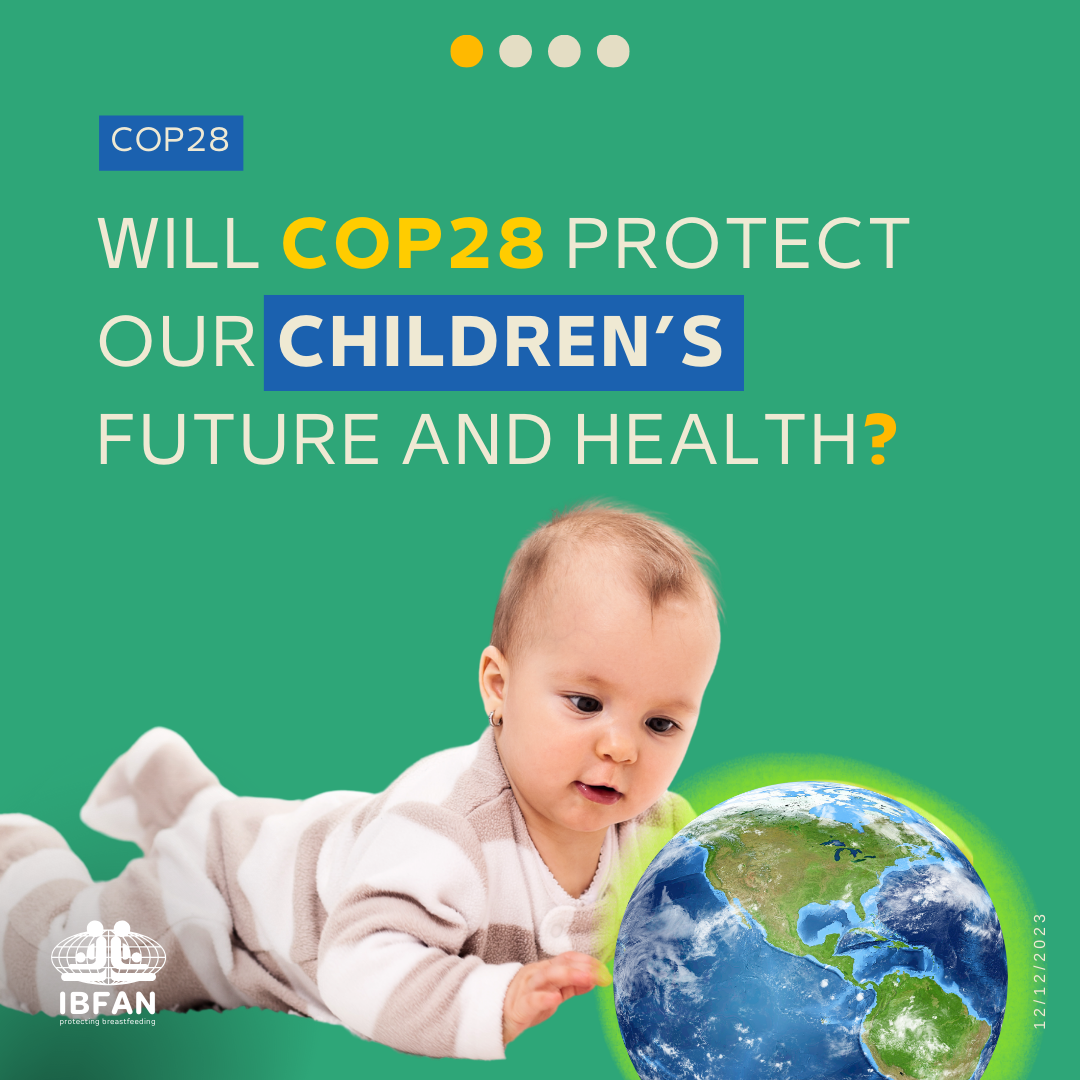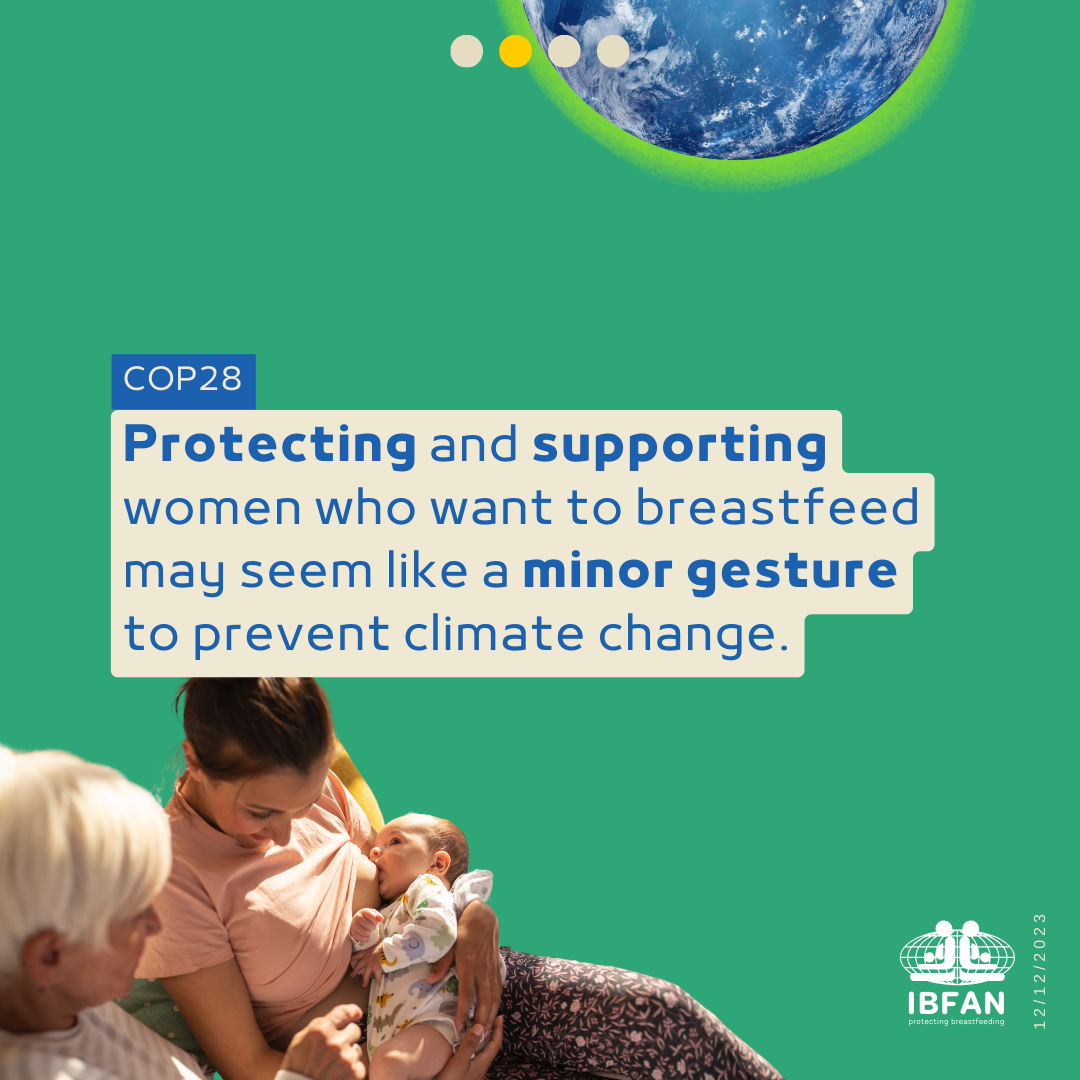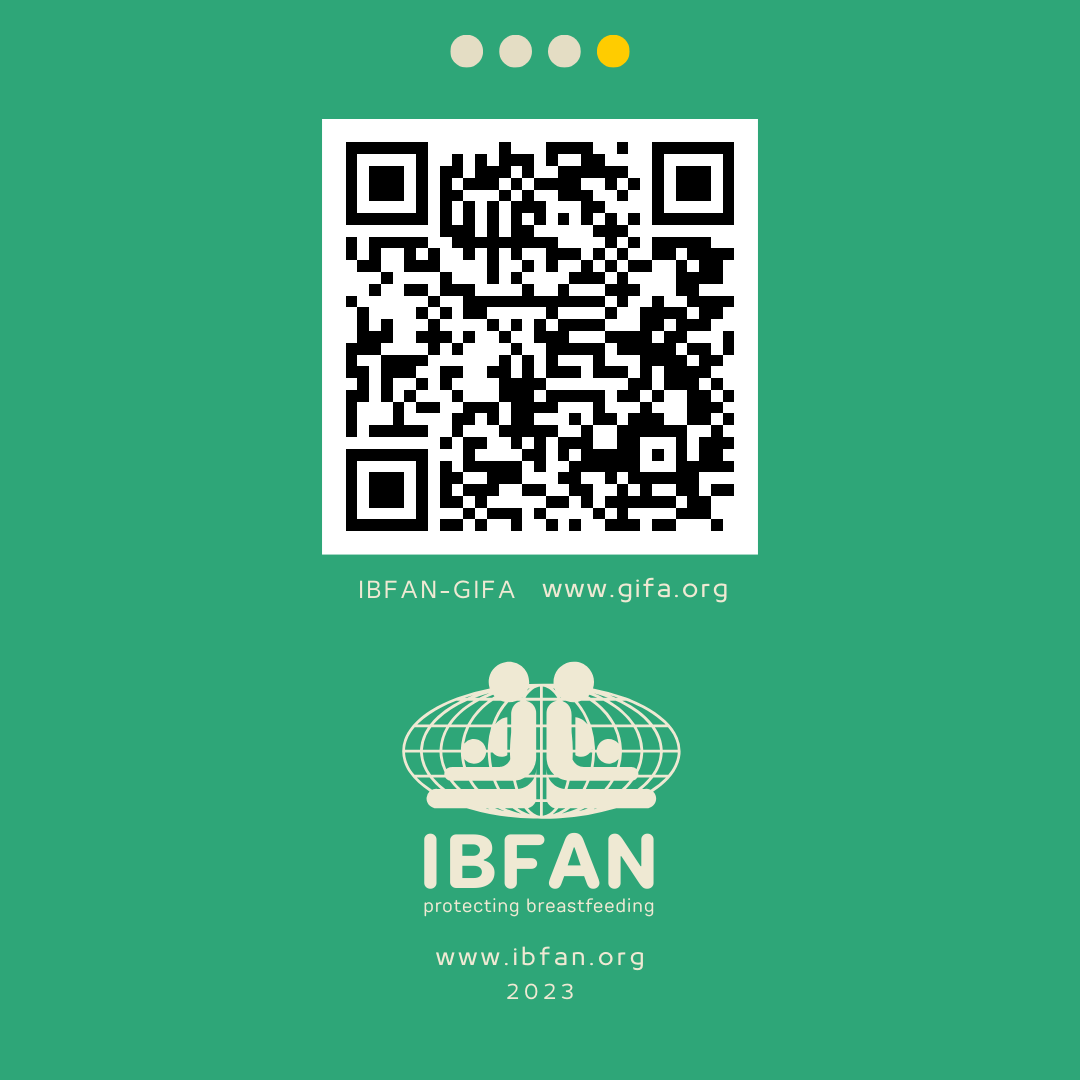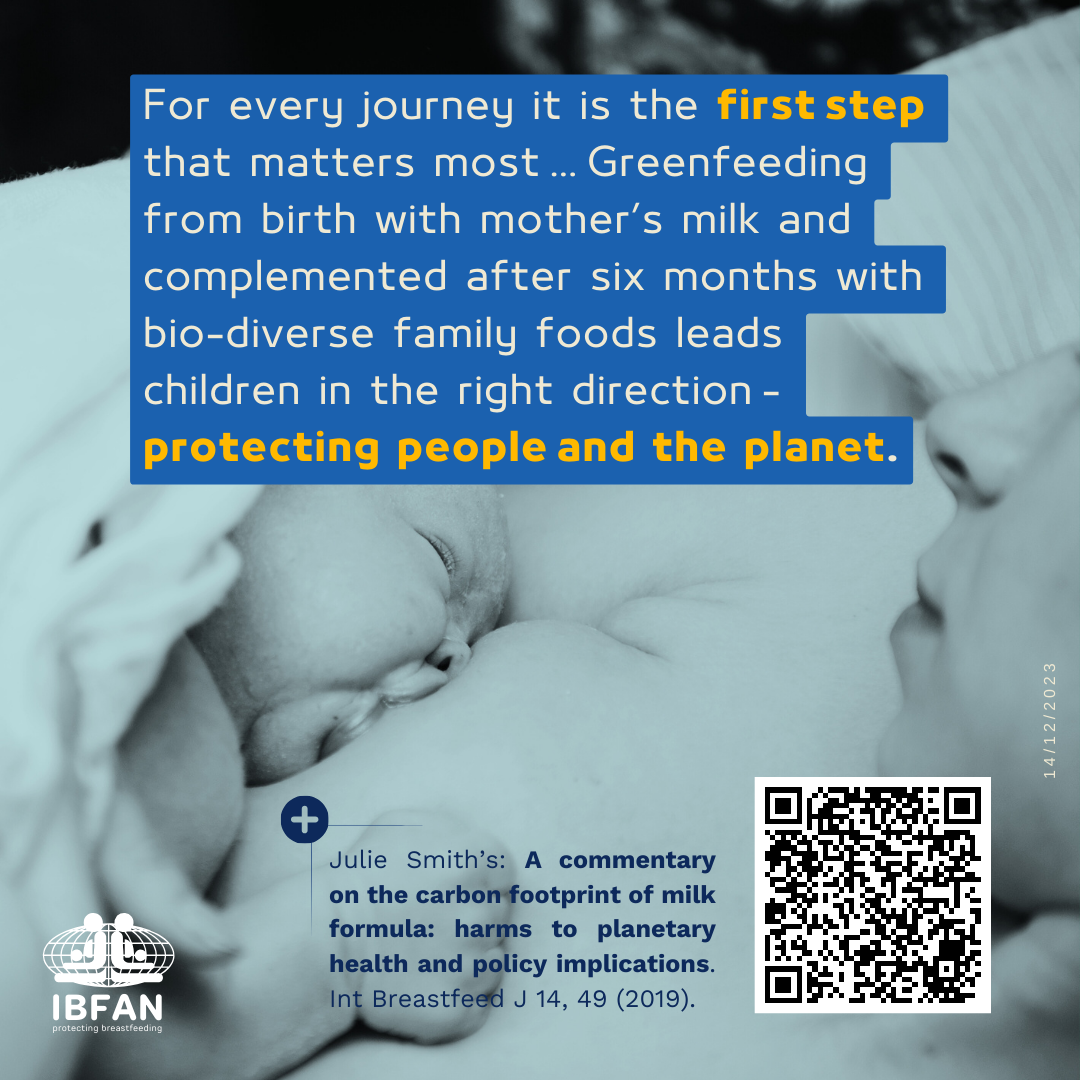03 December 2023 – IBFAN-BMA
Cop 28 30 Nov – 12 Dec 2023, Dubai (UAE) – Main Page
IBFAN GIFA Statement
Innovative financing for a gender-equitable first-food system to mitigate greenhouse gas impacts of commercial milk formula: investing in breastfeeding as a carbon offset.
Frontiers: Julie P. Smith1*Bindi Borg1Alessandro Iellamo2Tuan T. Nguyen3Roger Mathisen3
Commentary on the carbon footprint of milk formula: harms to planetary health and policy implications.
by Julie Smith, . International Breastfeeding Journal
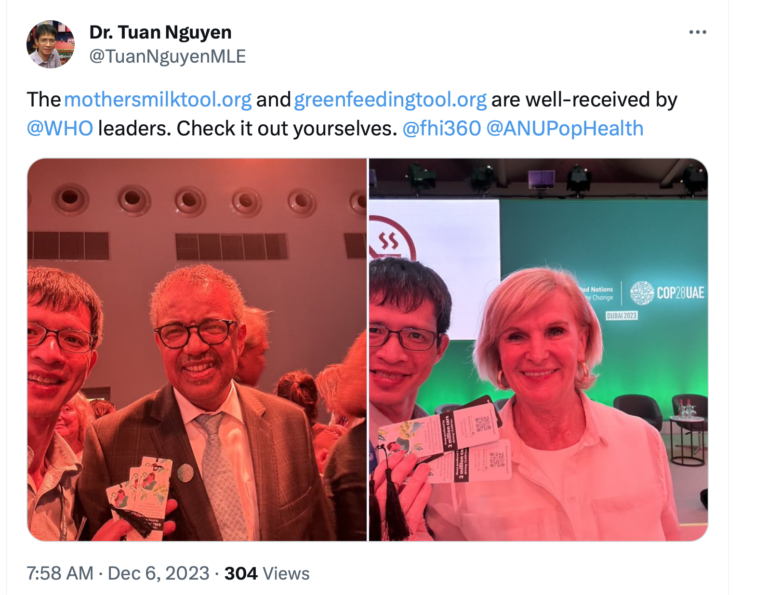
The Corporate-led food system has to be transformed
The notion that the current corporate-led food system is not only safe, but is the only feasible way forward – must be challenged and is why IBFAN takes an active part in negotiations at Codex, the UN Global standards setting body. We expose how multi-billion dollar health-harming industries are undermining confidence in sustainable local agriculture, breastfeeding and biodiverse food systems, pushing instead the global trade of all manner of risky ultra-processed foods and novel products as the solution to the climate crisis. Much of this misleading marketing is channeled through social media and influencers and targets mothers.
In emergencies breastfeeding keeps children alive
“UNICEF’S vision for breastfeeding is founded on the understanding that breastfeeding is not a one-woman job; that making it work requires government leadership and support from families, communities, workplaces and the health system.” UNICEF USA in Action
“Evidence shows that pregnant and lactating women, newborns, children, and adolescents are particularly vulnerable to climate change due to their unique stages in the life course. Despite contributing the least to greenhouse gas emissions, newborns, children, and adolescents today and future generations will bear the worst consequences during their lifetime. Newborns and younger children, including those unborn, are uniquely at risk because they breathe faster, have higher metabolic rates, and are developing their immune systems, amongst other physiological, developmental, and behavioural vulnerabilities.”
Prioritizing women’s, children’s and adolescents’ health in the climate crisis PMNCH 21.11.23
Infant and young child feeding in emergencies: A third of the victims of war are children and almost a million are born each year as refugees. For them, hunger and communicable diseases defy all international goals and targets. IBFAN and partner NGOs work in countries hit by climate-related flooding where poor sanitation, malnutrition and disease outbreaks are hitting children under five the hardest. Babies are at great risk of water-related diseases, with diarrhoeal disease the second biggest killer of under-fives. Commercial donations of baby feeding products exacerbate these problems and undermine the efforts to protect breastfeeding.
Dr Marcos Arana, IBFAN Mexico calls for more empathy:
“The most vulnerable members of our society are the ones hardest hit by pandemics and emergencies: people in the global south, those living in poverty or with disabilities, the elderly and the very young. Adversity strikes those who have the least and pollute the least, as well as those who have inhabited this planet for the shortest time. The beginning of human life is when breastfeeding stands out as the most reliable and sustainable food system, mitigating and adapting to the effects of climate change. Breastfeeding is also one of the main axes for the development of empathy, which is the antidote to violence. Empathy is also essential for all of us to develop new ways of inhabiting this planet.”
Dr. Julie Smith, Hon Ass Prof, Australian Centre for Economic Research on Health.
“The most alarming finding in our research is a very large proportion of greenhouse gas emission impact is associated with the so-called growing up milks or toddler formula … In China, nearly half of the sales of milk formula is toddler formula. For the UK alone, carbon emission savings gained by supporting mothers to breastfeed would equate to taking between 50,000 and 77,500 cars off the road each year”.
Statement by Dr Tedros CAC45 2022
“You meet at time of unprecedented challenges. Conflicts and climate change are exacerbating food insecurity and malnutrition. Most people around the world who have access to food cannot afford healthy diets. Deforestation and habitat loss are increasing the risk of zoonotic pathogens. Anti-Microbial Resistance, environmental contamination and degradation, occupational hazards, unsafe and adulterated foods – the list goes on. A transformation of the world’s food systems is needed urgently, based on a One Health approach that protects and promotes the health of humans, animals and the planet. The Codex Alimentarius has a critical role to play in guiding country regulations that promote health, while facilitating fair trade. WHO remains committed to working with FAO to develop and deliver high quality scientific advice and evidence-based global food food safety guidelines and standards.”
Dr Tedros Adhanom Ghebreyesus, WHO Director-General welcome address: CAC45
Original text: Baby Milk Action

